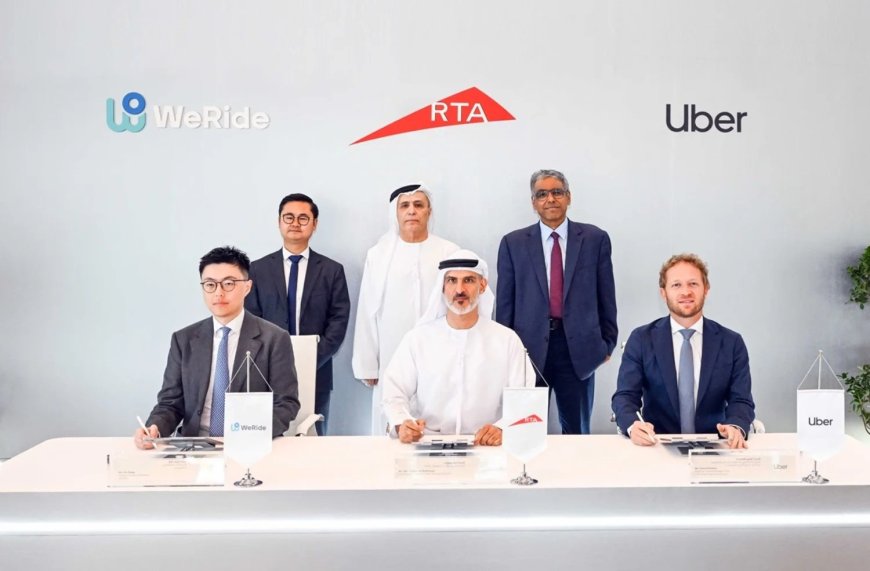Dubai’s Self-Driving Taxi Trials: Pioneering the Future of Urban Mobility
Dubai to Launch Self-Driving Taxi Trials in 2025

Dubai is once again setting the pace for innovation, this time in the realm of autonomous transportation. The city’s Roads and Transport Authority (RTA) has announced a landmark partnership with Uber Technologies and WeRide, a global leader in autonomous driving technology, to launch trials of self-driving taxis later this year. This initiative marks a major milestone in Dubai’s ambitious plan to transform its transport ecosystem into one of the smartest and most sustainable in the world.
Read More:- Dubai to Launch Self-Driving Taxi Trials in 2025
A Vision for Smart and Sustainable Mobility
Dubai’s self-driving taxi trials are a key component of the Dubai Smart Self-Driving Transport Strategy, which aims to convert 25% of all mobility journeys in the emirate into autonomous trips by 2030. This forward-thinking strategy aligns with the city’s broader vision to become the world’s smartest city, leveraging cutting-edge technology to improve quality of life, enhance road safety, and reduce environmental impact.
Mattar Al Tayer, Director General and Chairman of the Board of Executive Directors of the RTA, highlighted the importance of this initiative, describing it as a “significant leap towards a smart and sustainable future for mobility.” The introduction of autonomous taxis is expected to not only boost efficiency but also provide seamless integration with Dubai’s existing public transport network, especially enhancing first and last-mile connectivity.
How the Trials Will Operate
The pilot phase, scheduled to begin by the end of 2025, will see a fleet of autonomous vehicles operating with safety drivers on board. These safety drivers will oversee the vehicles’ operations to ensure passenger safety and smooth functioning during this initial stage. Users will be able to hail these self-driving taxis conveniently through the Uber app, making the experience accessible to residents and visitors alike.
This cautious yet progressive approach allows the RTA and its partners to gather vital data on vehicle performance, passenger experience, and integration with urban infrastructure. The insights gained will pave the way for a full-scale commercial rollout of fully driverless taxi services planned for 2026.
Strategic Partnerships Driving Innovation
Dubai’s move into autonomous taxis is supported by strategic collaborations with global technology leaders. Uber brings its extensive ride-hailing expertise and user base, while WeRide contributes advanced autonomous driving technology and operational experience. WeRide has already launched commercial driverless mobility services in Abu Dhabi and operates in multiple countries worldwide, making it a trusted partner for this ambitious project.
Additionally, Dubai is working with other autonomous vehicle providers such as Baidu’s Apollo Go and Pony.ai, reflecting the city’s commitment to fostering a competitive and innovative environment for autonomous mobility.
Benefits Beyond Convenience
The introduction of self-driving taxis is expected to deliver multiple benefits:
-
Enhanced Safety: Autonomous vehicles use sophisticated sensors and artificial intelligence to reduce human error, which is responsible for the vast majority of traffic accidents. This technology promises safer roads for all users.
-
Greater Accessibility: Self-driving taxis will provide improved mobility options for senior citizens, people with disabilities, and those who do not drive, promoting inclusivity in urban transport.
-
Environmental Sustainability: Many autonomous vehicles are electric, supporting Dubai’s goals to reduce carbon emissions and promote greener transportation alternatives.
-
Traffic Efficiency: AI-driven route optimization can help alleviate congestion by improving traffic flow and reducing idle times.
Preparing the City for Autonomous Vehicles
Dubai has been proactive in creating a regulatory and infrastructural environment conducive to autonomous vehicle deployment. The UAE government has introduced legislation to classify and regulate autonomous vehicles, ensuring safety and compliance. The RTA’s First and Last-Mile Strategy ensures that autonomous taxis will complement existing transit options, making it easier for commuters to complete their journeys efficiently.
Moreover, the city has been conducting supervised testing of driverless vehicles on public roads since 2023, gaining valuable experience and public confidence in the technology.
Looking Ahead: What to Expect
By 2026, Dubai aims to have fully driverless taxis operating commercially across the city. Residents and tourists will be able to summon these vehicles through familiar ride-hailing platforms, experiencing a new level of convenience and innovation in urban travel.
The trials this year will be critical for refining technology, addressing challenges, and building public trust. As the city continues to expand its autonomous vehicle fleet, it is also exploring complementary innovations such as electric air taxis, expected to begin operations in early 2026.
Conclusion
Dubai’s self-driving taxi trials represent a bold step toward the future of urban mobility. By blending advanced technology with strategic partnerships and thoughtful regulation, the city is setting a global example of how autonomous vehicles can be integrated into a modern transport system. This initiative not only promises safer, greener, and more efficient travel but also reinforces Dubai’s reputation as a world leader in smart city innovation.
As the trials commence and autonomous taxis begin to navigate Dubai’s streets, the city is driving confidently into a new era—one where technology and sustainability go hand in hand to enhance the lives of millions.















































































